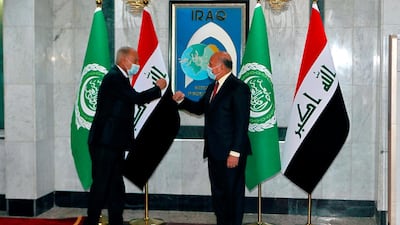Iraq said it supported efforts to restore Syria's membership of the Arab League, 10 years after it was expelled for a crackdown on protesters that escalated into a civil war.
Iraqi Prime Minister Mustafa Al Kadhimi received Arab League Secretary General Ahmed Aboul Gheit on Saturday on a visit to Baghdad.
They discussed Syria and other regional issues such as the war in Yemen and Lebanon's economic crisis.
The prime minister's office said Iraq “supports initiatives to end the conflict in Yemen and for Lebanon to overcome its difficult circumstances, as well as Syria's return to the Arab League".
"Iraq stands by the means of internal dialogue to resolve the war," it said.
Iraq is one of several countries in the region that did not cut ties with Syrian President Bashar Al Assad's government after 2011.
Syria was expelled from the Arab League that year.
At the time, Lebanon and Yemen voted against the league's decision and Iraq abstained.
A decade after the start of the war, little hope is held out for Syria's peace process. Talks brokered by the UN, Russia and Turkey have yielded little tangible benefit.
But several Arab states have now backed calls to re-admit Syria to the league as a means for opening up a regional track to the peace process.
However, critics said that would be seen as a political boost for Mr Al Assad's isolated regime.
Mr Al Kadhimi said that an effective presence of the Arab League was important for the region, stressing that Iraq is looking forward to the convening of the next Arab summit.
"The Arab League has an important role to play in promoting constructive rapprochement, overcoming differences, and consolidating efforts between active regional states that are historically linked," he said.
Founded in 1945, the Arab League has been criticised for ineffectiveness during regional disputes and crises.
"The Arab League is passing through a critical stage due to the lack of funding and the difficult conditions that some Arab countries are going through," Mr Aboul Gheit said.
He affirmed the league's support for Iraq and praised the government's recent initiatives to engage with the region.
In the past two weeks, the Iraqi prime minister has led a high-level delegation to Saudi Arabia and the UAE.
Mr Al Kadhimi is leading a campaign to increase trade and economic co-operation with neighbours in an effort to revive the Iraqi economy.
Saudi Arabia and the UAE both announced a $3 billion investment each in a joint fund with Iraq to boost the private sector.
Mr Aboul Gheit also met Iraqi Foreign Minister Fuad Hussein, who stressed that Syria's "instability impacts Iraq's security".
"The unstable situation in Syria is affecting us," Mr Hussain said during a press conference with Mr Aboul Gheit.
In recent weeks, Sheikh Abdullah bin Zayed, UAE Minister of Foreign Affairs and International Co-operation, called for Syria to be readmitted to the league to ensure a regional effort in mediating an end to the civil war.
The UAE reopened its embassy in Damascus in 2018 in a sign of thawing relations between the Syrian government and the Arab world after years of diplomatic isolation.


